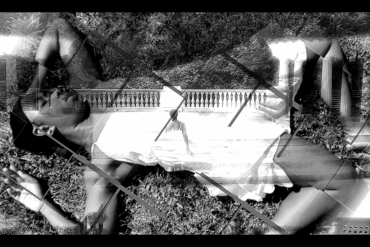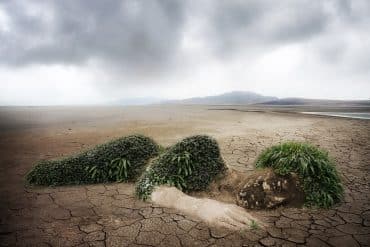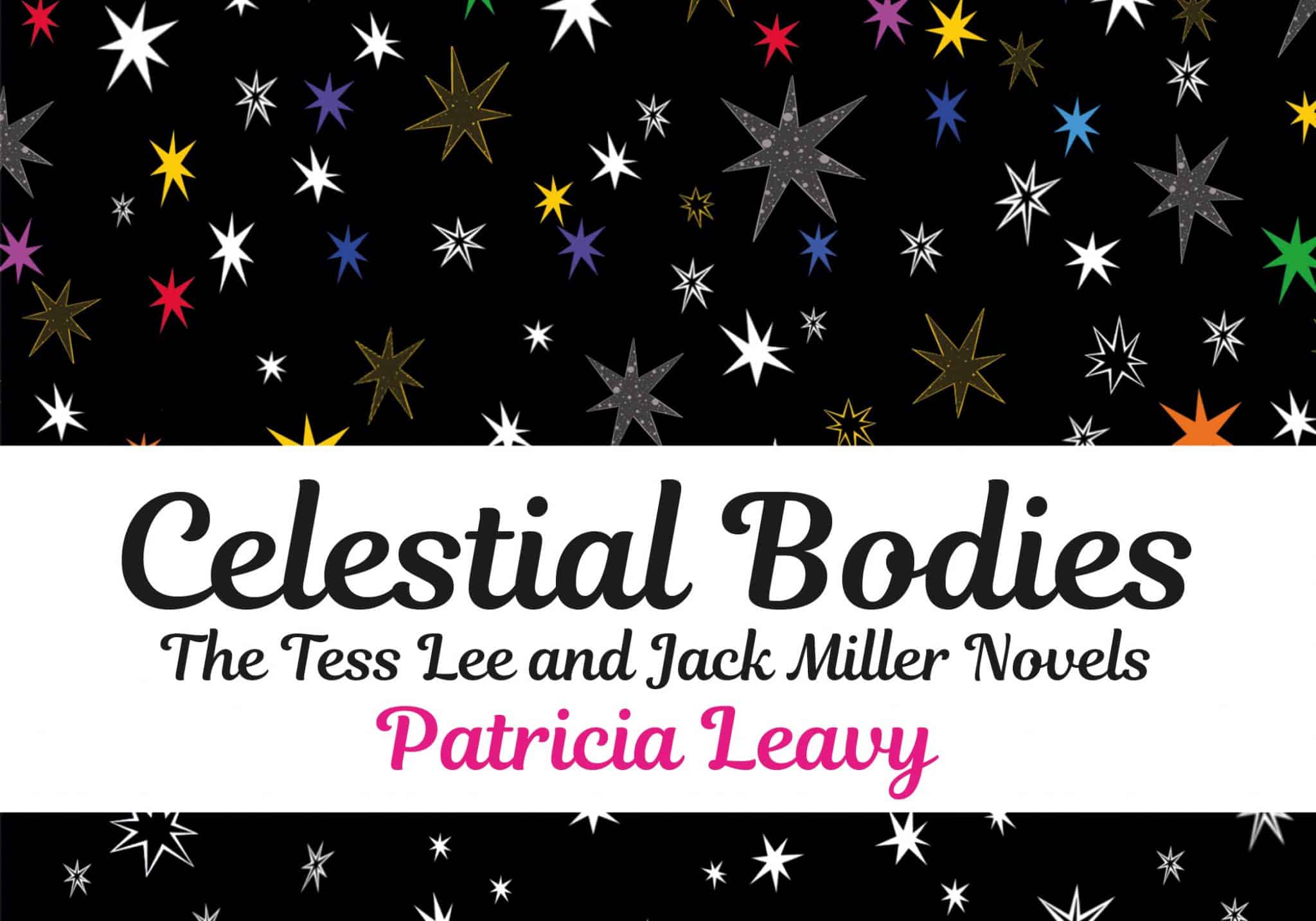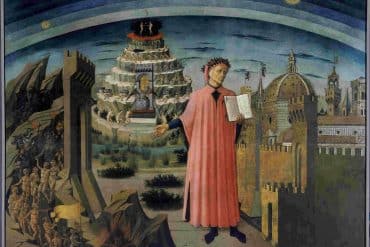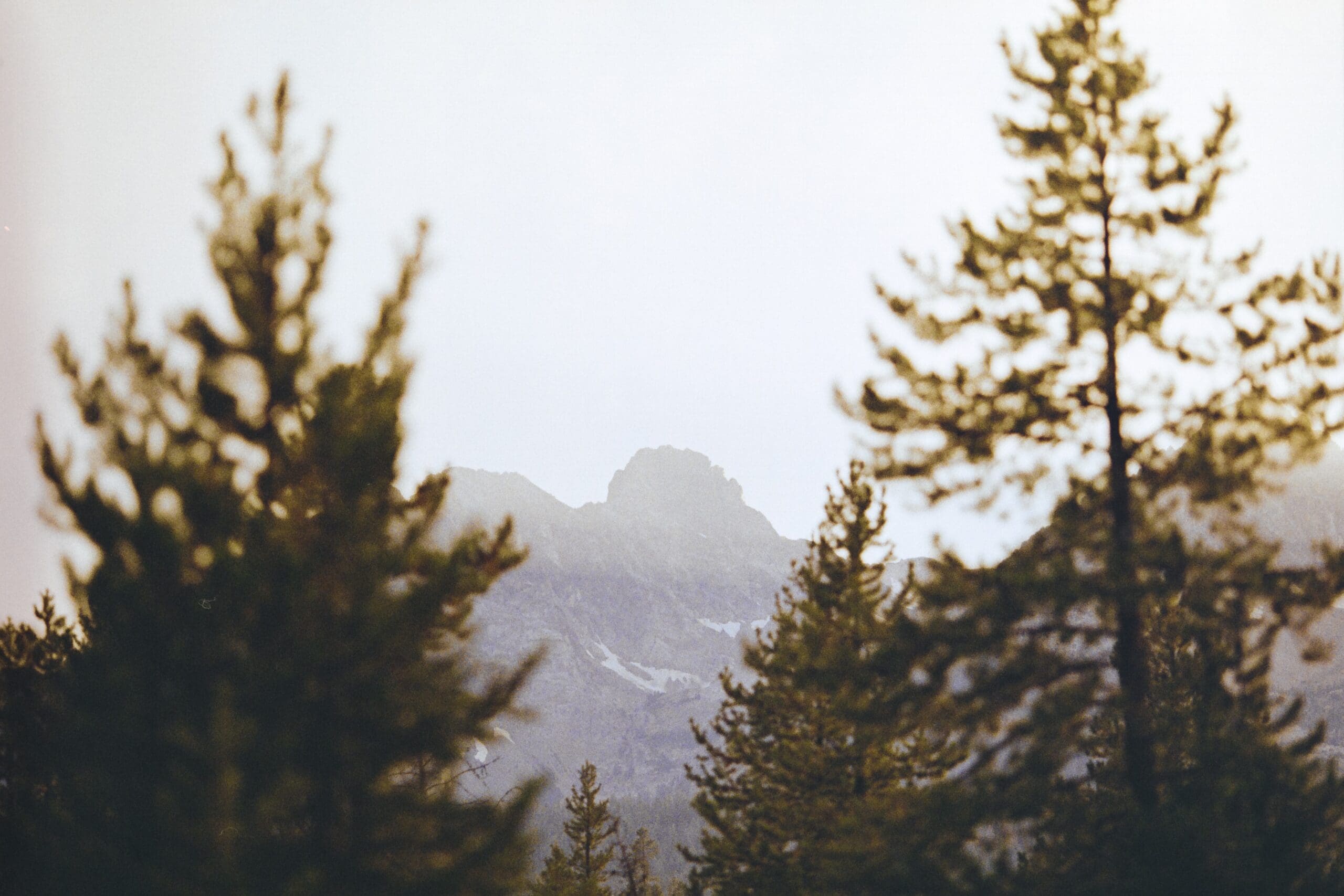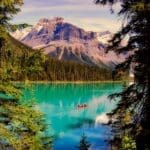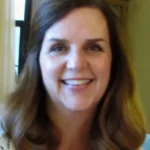Camping and Building Powerful Connections at Bull Trout Lake.
Author’s Memo
Camping and Building Powerful Connections at Bull Trout Lake is an essay about the way technology can intrude and obscure what may be our most important human experiences: building and strengthening connections with one another, and especially doing this in wild, natural settings devoid of digital encroachment. The essay describes a simple few days camping with my adult sons: lovely, sun-soaked days filled with laughter and beauty … in which my peace and elation were threatened by something mundane: the loss of my phone in a marsh.
But because I was thus untethered, I received the chance to know my companions—and especially my wonderful autistic son—more fully; to increase my understanding and appreciation of his unusual gifts and perspective. The essay details his uniqueness and the actually quite casual recovery of pieces of our relationship that are too often misperceived or, more simply, missed … due to the press of time, to the distractions and competitions of an information-saturated society, and to the heavy reliance on technology and entertainment that I—that many of us—find so easy to indulge. When we succumb, I believe we are making regrettable tradeoffs. This is basically the essay’s most central assertion.
‘The essay describes a simple few days camping with my adult sons: lovely, sun-soaked days filled with laughter and beauty.
There are also descriptions of the simple, yet profound opportunities and pleasures, the connections, the joy, and the healing to be discovered in wilderness. These are readily available to many of us … it can be as simple as getting out on a trail, or packing up for a campout at a lake. Yet it is just as easy to ignore or to dismiss or to fail to seek such discoveries.
The essay also touches on the mysticism of prayer, which was an unexpected part of the experience and of my exploration through writing. Prayer makes some people itchy; of course I know that. Nevertheless, I am deeply drawn to it because of my cultural background, and it is a regular part of my life. Its practice does also complicate my feelings about managing the concerns of the day-to-day, about appropriately navigating my family (and other) relationships, and about the vagaries, the obstacles, the fragility, and the exigence of belief.
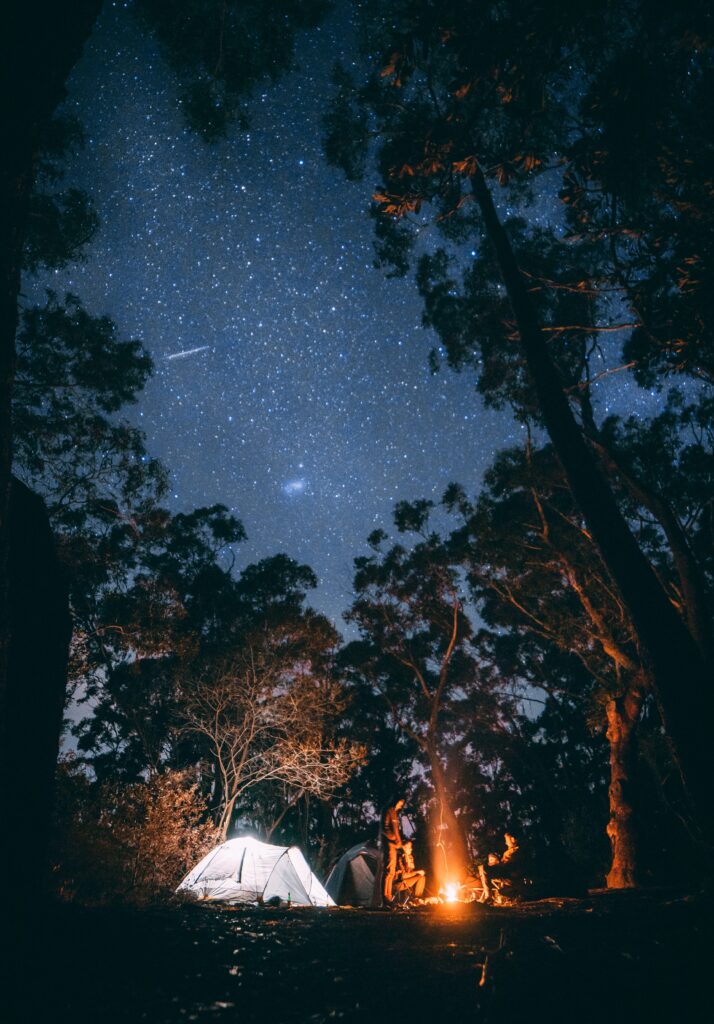
Camping and Building Powerful Connections by the Bull Trout Lake
A faded, decades-old tent has become key to a great camping trip for me. I love its familiar saggy awning, detachable rain fly, cranky zipper, and tall, roomy ceiling. We camp with adult sons or extended family, another thing I love: voices around the campfire. Joking, jostling for best marshmallow position.
Looking sidelong at this spacious tent, our camping buddies ask: how many are sleeping in there?
Just the two of us.
Well, it’s quite the Palace!
The joke’s on them when we return to camp wet and clammy from the lake or the river. “Um. Do you mind if I change clothes in The Palace?”
“Have at it,” I say, laughing.
This past July, we three—husband Pat, son Eric, and I—drove northeast on Highway 21 on a Sunday afternoon, pursuing the impossible: a pleasant, uncrowded campsite for a small group at a lake in the Sawtooth Mountains. We couldn’t hike or backpack in, because we had a couple of kayaks and a paddleboard.
Plus, old.
And not nimble enough planners to have snagged a spot last winter, when a select few campgrounds open for reservations in advance; a smattering of first-come, first-served spots remained, and it was one of these we hoped for.
‘We camp with adult sons or extended family, another thing I love: voices around the campfire.
Promise to keep it a secret? Just beyond Banner Summit, where Highway 21 begins a drop into Idaho’s Stanley Basin, turn left onto FR 520, a dirt road. The Bull Trout Lake Campground sign has been weathered (and, well, shot up) beyond recognition.
We traveled this rutted road in faith for three miles, to where 15 campsites nestled beside the lake. We found families and couples relaxing beneath camper awnings or reclining in chairs by their tents. Better planners all, and our spirits began to flag. But at last we rocked our dusty wheels into #14. Shade around the picnic table and the campfire ring. Flat spaces for tents. Quiet and pristine, tucked near a wooded trailhead. The lake a quarter-mile stroll across a creek and through some marsh grass. Paradise.
While the guys set up camp, I drove 23 miles into Stanley to text our location to another son and his girlfriend, who were soon to exit a Seven Devils backpacking adventure. Just in case, I got permission from a friendly clerk to post a note on the Mountain Village Mercantile bulletin.
That evening, we three advance-scouts had time to get acquainted with Bull Trout Lake. We built a campfire, cooked bratwurst, and stirred coleslaw. Our tents were dappled with leaves beneath the sunset. Bullfrogs sang, mosquitos were restrained. We roasted marshmallows. If our message got through, Joe and Kate would arrive Monday midday.
‘It felt lucky to have their company for these few days.
In the morning, Pat was on the lake early to catch breakfast: two fat rainbow trout, which we fried up and enjoyed with blueberry pancakes. We drove the other watercraft north to the boat dock and paddled them long across the lake to the shoreline closest to our site, just in time to see Joe and Kate pull up. Glorious reunion then. A former me would have thought nine days backpacking might have tired them from tent life, but they seemed to be just getting started. Kate and I jumped into the lake. We all paddled, fished, talked and laughed, perusing photos from their Seven Devils. Joe and Kate often work a straight thirty days or more in a far-off city, which allows them a two- or three-week adventure a few times per year. It felt lucky to have their company for these few days.
That night, we cooked Eric’s beef stew over hot coals. I’d had a birthday, so we unwrapped a pineapple-walnut cake and sang around the campfire. After dark, the three young adults sat joking and laughing while Pat and I tucked into our Palace sleeping bags. We gazed up through the triangle of skylight, sad to note wildfire smoke obscuring the stars. But we could hear soft laughter of voices we loved at the campfire, so we drifted off.
‘We gazed up through the triangle of skylight, sad to note wildfire smoke obscuring the stars. But we could hear soft laughter of voices we loved at the campfire, so we drifted off.
Next day, we drove to Stanley to raft the Salmon River. Kate’s from New York and was new to this kind of adventuring, but she was quick and game, a natural. At Jump Rock, a twenty-foot climb and a leap sent you splashing deep into the river, ka-johnnnngg. Pat and I left this feat to the next generation, and we were so happy when Eric took a turn. He’s the boy, the man, we circle back to in worry. His independence from his parents is too-often hampered by, well, his parents. But also by the challenge of autism.
Eric is cheery in temperament, persistent in faith and goodness, courteous, determined, dependable. He considers autism to be an inconvenience. It exacts its price in sociability. In focus and daily capacity, in our faith in his efforts to catch and hold the point of tough endeavors like college. Career. We fret too much and sometimes forget the myriad challenges—church mission, university, work, and independence—that he continues to surmount. A few days of camping disrupt routines he depends on for strength and courage. The river jump was an excellent sign: he felt relaxed, confident.
Back to camp for hiking, fishing, paddling, Frisbee. Eric stayed behind for all of it, to regroup, to nap and read, to gather wood and build the evening’s fire. That night we sat around it playing Chronology. An event, perhaps obscure, is read, and teams take turns guessing the century, the decade, the year. At one point, Kate said to Joe: “Okay, look at me, and I’ll give you the signal.”
“I have to look at you more?” he said. “No problem.”
The stars stepped forward, after days of wildfire smoke.
‘The stars stepped forward, after days of wildfire smoke.
Our last morning, Pat and Joe took the kayaks on the lake. Eric and Kate were sleeping late in their respective tents, so I left the Palace and took a long walk through the marsh, seeking a pathway around the lake. But the marsh advanced, clotted with thick, hummocky stands of grass. Boggy, threading inlets of water wove through, easy to stumble in. I watched my step, bushwhacking toward a grove of cedar and pine at the base of canyon walls. There’d be no skirting the perimeter, the going was too rough, and Eric wanted to cook sausages over the fire at 9. After that, we’d break camp and company.
I walked further, pausing to enjoy the morning sky, the majestic views in each direction. Taking care to avoid sinkholes and thickets of bramble was hard going. In the cedar grove, I found peace and silence; I gave thanks for beauty, family, connection and took photos until my phone’s battery gave out, freeing me up to take better notice. Thick bark on the cedars was beautiful, deeply grooved in rivulets of golden and reddish brown. A sage grouse prrrred, fluffed with indignation at my presence, but willing to share the space. I saw a couple of jackrabbits and came upon the riven remains of a moose. I slapped away flies and mosquitos, but even this did not bother me.
Eventually, I trekked back to the lake to meet the fishers and walk back to camp. At the shoreline, I bent to help pull Pat’s kayak, laughing and chatting as Joe and Kate came off the water. We started toward Eric’s waiting fire. The blue smoke wafting through sunlight, screened by fir trees and morning mist, it was beyond pretty. I wished I had the battery for a snapshot.
‘Where was my phone, anyway?
But wait.
Where was my phone, anyway?
I slapped at pockets, unzipped my backpack. Checked again.
Must be back at the shoreline. Maybe when I bent to help pull Pat’s kayak?
I hustled back to the put-in, eyes on the ground, hoping for the glint of a mist-green phone. I looked everywhere: in the boats, in the water, beneath life jackets. I pushed aside clumps of floating bog mat.
Behind me were acres of marsh, the grove of cedar skirting the ring of mountains. I looked for evidence of my trail through the bog, but the grasses were tall, moist and resilient. I tried a quick grid search, but quickly realized I should get back to enjoy our final morning’s family breakfast.
And was glad I did. Eric’s meal tasted good, and he was happy. Kate made a joke about the year, 1950? 2005? She was referencing the Chronology game; also, we had the sense of suspension, of timelessness. What world, what time, it didn’t matter.
I broke that spell with my worry. In the prayer over breakfast, I asked aloud for help to find my phone. I felt embarrassed. In the many gifts of the morning, this seemed frivolous. Also, Kate had no faith tradition I knew of; Joe was ambivalent. Surely, in a world shuddering with need … my prayer was petty. Brazen. Silly.
‘In the prayer over breakfast, I asked aloud for help to find my phone. I felt embarrassed. In the many gifts of the morning, this seemed frivolous.
After breakfast, we fanned out across the marsh: five good souls picking through mud and bunchgrass. I cut back to the cedar grove. I prayed again, trying for faith. Oh, I wanted that phone. The expense was part of it, but also I wanted the photos I’d taken over this rare family gathering. I needed, expected—was it a little lame?—divine help to find it.
Joe sidled up to me in the marsh and suggested we drop his phone as a test: would we be able to see it? He joked, looking around at all the beauty: “Oh, it’s so glorious!” he said, grinning, and made an exaggerated show of letting go his phone. Laughing, we peered into the boggy grass. Ka-johnnnng……gone.
Joe parted thick blades and retrieved it, but if you didn’t know it was there, you’d never find it. I searched long minutes, trying to feel guidance, persistence morphing into insistence and impatience. But I had to face facts. When I finally made my way back to camp, the others were all there packing up. No one asked about the phone.
We parted then, three vehicles headed three separate ways, never an easy moment. Consistent in distraction and loss, I left my eyeglasses on the grass beside the paddleboard pull out, and had to make a quick detour back to get them.
Eric and I shared a car, just us two for the next leg of our journey. Our conversation lagged after awhile. His phone couldn’t be recharged in my car, so we truly had No Phone. No downloaded music. No radio. No Neil Gaiman audiobook, no podcasts. Talk about first-world problems, but still I felt antsy, unmoored. I wished aloud about the photos I knew I’d lost.
‘Eric and I shared a car, just us two for the next leg of our journey. Our conversation lagged after awhile. His phone couldn’t be recharged in my car, so we truly had No Phone. No downloaded music. No radio. No Neil Gaiman audiobook, no podcasts.
Finally I asked if Eric knew any poems by heart. He recited Alexander Pope’s “The Dying Christian to His Soul,”entirely new and impressive to me. Emboldened, I took a turn, stumbling through “To Time it never seems that He is brave.”
He gave me the Gettysburg Address, faltering only slightly. Together, we worked to remember forgotten lines from the middle. We thought we got it all in the end.
I tried Elizabeth Bishop’s “The art of losing isn’t hard to master” and found I’d, well, lost some of the transitional lines and words. I kept at it, tricking myself into stanzas, hoping they’d materialize. Eric said, “Have you noticed just a bit of irony in your choice of poem, Mom?”
Oh, kid. You’re killing me. I had not noticed.
The road wound ahead, and Eric mentioned the fantasy novel he is writing, working diligently each week, his plans and the sequel he has in mind. We talked about the music he loves (it’s not to my taste), but how for him it stirs imagination. How I need more imagination. I shared this sincerely, admiring the spirals and eddies, the turns of mind Eric can access quickly and freely.
Eventually the road did what roads do: got us to a town. Calmed by the lovely, unexpected hours with my son, I felt sad to finally arrive.
Thinking of the speech, Eric spoke at length about the three days’ battle at Gettysburg, days filled with blunders, with lame but consequential jokes and tricks, with disasters of assumption and hesitation; yet also with heroes of circumstance and courage. We imagined a trip he could plan, to visit the site he has loved since we went there when he was five. He might fly east to Philadelphia, rent a car, spend three days at the battlefield to visualize what took place there. The pilgrimage spooled out in words, vivid, imperative. His goodness, his orderly memory, his robust and hearty understanding. All so very Eric, yet often obscured by the press of time and distractions of modern life.
Eventually the road did what roads do: got us to a town. Calmed by the lovely, unexpected hours with my son, I felt sad to finally arrive.
Nevertheless, we drive straight to the Verizon store to replace my phone. So quickly I was tethered again. Spotify, podcasts, Facebook. Audiobooks. Endless poetry, each line and stanza in place. History, speeches, Lincoln, Alexander Pope. Eric’s novels on Wattpad. News about wildfire, virus, and strife. A map of Seven Devils where Joe and Kate had been. A map of Yellowstone, where Eric and I were headed next. Retail outlets selling bear spray. Bills and email, work, rafts of text, voicemail. What bargains had I, would I, make to keep it all at my fingertips? What is lost in these bargains?
‘I felt the gentlest, the kindest, most loving chiding: Heidi. Laughing quietly, it rode a shining new bead of memory, fragile as a glimmer of starlight, rippling with seriously, girl? … bearing a thousand lovely words between my son and me.
And look at me in that phone shop. Just look. Ever intent on the Palace, I wanted more. I scanned my new phone hungrily for Bull Trout Lake photos that might have made it to cloud storage from our remote campsite, even while I knew they really couldn’t be there.
I felt the gentlest, the kindest, most loving chiding: Heidi. Laughing quietly, it rode a shining new bead of memory, fragile as a glimmer of starlight, rippling with seriously, girl? … bearing a thousand lovely words between my son and me.
Credits
Featured image of Sunset at the Sawtooth Mountains by Caleb Woods for Unsplash
A camping family by Jonathan Forage for Unsplash
Learn More
New to autoethnography? Visit What Is Autoethnography? How Can I Learn More? to learn about autoethnographic writing and expressive arts. Interested in contributing? View our editorial board’s What Do Editors Look for When Reviewing Evocative Autoethnographic Work?. Check out our Submissions page. View Our Team in order to learn about our editorial board. Please see our Work with Us page to learn about volunteering at The AutoEthnographer. Visit Scholarships to learn about our annual student scholarship competition.
Heidi Naylor writes and teaches in Idaho. Find her at heidinaylor.net.


